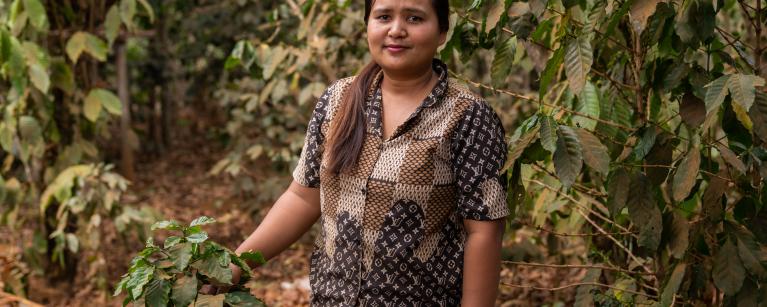SOLAR Project: Pheuy Thavisak Gender equality concepts brighten the horizons for Salavan coffee farmer

Pheuy Thavisak Gender equality concepts brighten the horizons for Salavan coffee farmer
It is not particularly easy to reach Lao Nga village. Perched upon the Bolaven Plateau in the southern reaches of the Lao People’s Democratic Republic, the village is just 30 kilometres from the district capital, but it is hard going to traverse the bumpy dirt roads, particularly when they swell with mud in the rainy season. But if you are willing to make the journey you will be greeted by a lush green paradise for coffee lovers, with plantations stretching in all directions and the aroma of coffee wafting up from villagers’ kitchens as they roast coffee beans using traditional equipment. If you’re lucky, someone might be kind enough to make you a perfect cup, but don’t expect to find a café waiting for you – at least not right now.
Pretty much everyone in Lao Nga is engaged in coffee farming, and given this singular pursuit and its remote location, it is probably no surprise that tradition has generally ruled all aspects of village life – be it on the plantation or in the home. But as local coffee farmer Pheuy Thavisak can tell you, things are starting to change. Born into a coffee farming family, Pheuy attended primary school as a child but did not finish. Her parents felt it was not advantageous for girls to get an education. Their belief was that after getting married, girls need to stay at home, take care of their children and do the housework. Such attitudes are commonplace in the Lao People’s Democratic Republic, which traditionally has been a patriarchal society where men are expected to be the primary breadwinners and decision-makers in a family. Women have to work on the farm with their husbands and also do all the housework themselves. Such traditions not only overburden women, but also discriminate against single mothers and women-headed households.
Now 33 years old, Pheuy puts forward a strong sense of purpose and is clearly a devoted mother to her two children, aged 11 and 13. The impression you get while speaking with her is not of someone who did not complete primary school. She is bright and engaging, and talks confidently about herself and her family’s plans. So far, both of her children have received more schooling than she had the opportunity to benefit security, occupational safety and from, and it is her particular hope that they will be able to attend university.
“Life as a farmer is not too bad, but it would be much better if we were better educated about coffee cultivation techniques,” she said. “There is a very good market for coffee in Laos and in other countries. I feel that we could earn more than we do now.”
Last year, Pheuy and her husband took a step towards this ideal by joining the Santiphab Coffee Production Group, an organization of 36 coffee-growing families in Lao Nga that came together through the support of the SOLAR Project, a European Union-funded initiative i mplemented by the ILO and Oxfam. Through the Group, members will be able to work together to improve coffee production and bargain collectively with buyers to secure better prices without having to rely on middlemen. “Membership in the group is very helpful. It enables me to improve my coffee products and marketing techniques. Generally, it is good for my family and myself,” she says. And through the SOLAR Project, group members are receiving training on social security, occupational safety and health, and – importantly – gender equality.
The concept of gender equality is new to the villagers of Lao Nga, but the trainings are slowly helping to change longstanding cultural traditions. As we toured her coffee farm, Pheuy noted that she and her husband recently attended a workshop on gender equality organized by the SOLAR Project. The session was eye-opening for them both: “Since then, my husband has spent less time drinking with his friends and helps me with the housework”, she said with a laugh. Pheuy believes that Lao Nga village is transforming into a good example for promotion of gender equality, as new ideas are taking hold and Group members are increasingly opening up to them.
As an example of her growing confidence, Pheuy has convinced her family to open a small shop selling basic household supplies. This helps to supplement their incomes from selling coffee cherries and to meet their high expenses. But she brightens up and laughs when she reveals her true dream of opening a café where locals and visitors can savour the exquisite taste of freshly brewed coffee made from beans that she has harvested on her own land. So perhaps Lao Nga village will be getting that café after all.